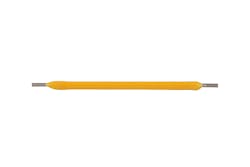Seoul Semiconductor starts mass production of its patented filament LEDs
Munich, Germany – Seoul Semiconductor, a world leader in LED-technology, announced the immediate start of the mass production of its LED Chip-On-Board Package for use in LED filament bulbs, a market currently estimated to be $1.3 billion globally.
Interested in more articles & announcements on LED components?
Mr. Ki-bum Nam, CTO of Seoul Semiconductor, said, “Based on its strong patents, Seoul Semiconductor will continue to increase its market share in the filament LED bulb market, which is a blue ocean market estimated at $1.3 billion.” He added: “We will widely promote the superiority of Seoul Semiconductor’s LED technology with its filament LEDs.”
Seoul Semiconductor's filament LEDs can realize high-quality light close to natural light through differentiated Chip-On-Board (COB) packaging technology and can produce stunning emotional lighting with omnidirectional emission technology, combining a small footprint with a wide beam angle. The Color Rendering Index (CRI) is 80 or better and different LEDs having a flux between 105 and 210 lumens are available. All of them feature a Correlated Color Temperature (CCT) of 2,700 K. Therefore, they are used to create a classical atmosphere through high-quality light in many spaces, like cafes and hotels or even bed- and living rooms, making them an alternative to incandescent light bulbs that have been phased out in 2014.
Development of this technology at Seoul Semiconductor started already in the early 2000s, even before there was a market for filament-LEDs, but production was held until the market was now ready for them. This decision demonstrates the company’s clear long-term strategy and vision. Seoul Semiconductor now holds hundreds of patents for filament LEDs, covering chip manufacturing, COB-packaging, module and bulb manufacturing processes. These are all core technologies for manufacturing filament LED products and this portfolio leads to a strong IP protection of customers using Seoul Semiconductor’s filament LEDs.
An official at Seoul Semiconductor stated: “We are readying legal actions, as many of the LED bulbs released in the market have infringed our proprietary technologies.”
The global light bulb market is estimated at 7 billion pieces annually, of which 2.5 billion units are light bulbs for various decoration purposes, a market being addressed by the filament LEDs. The application of them in this market has started and they can not only be applied to globe bulbs in their various forms, but also to candle lamps in special shapes. These diverse applications are supported by two different lengths of the LEDs: 38 mm and 50 mm.
# Reference
To learn more about Seoul Semiconductor’s filament LEDs:
http://www.seoulsemicon.com/en/html/Product/product_view.asp?catecode=2019
About Seoul Semiconductor:
Seoul Semiconductor develops and commercializes light emitting diodes (LEDs) for automotive, general illumination, specialty lighting and backlighting markets. As the fifth largest LED manufacturers globally, Seoul Semiconductor holds more than 10,000 patents, offers a wide range of technologies and high volume production of innovative LED products such as "Wicop" - Simpler Structured Package-Free LED, "Acrich" - the world's leading direct AC LED , "Acrich MJT - Multi-Junction-Technology" a proprietary family of high-voltage LEDs, and “nPola”, a new LED product based on GaN-substrate technology for over ten times output of conventional LEDs.
Contact:
Ariane Heim - Seoul Semiconductor Europe
+49(0)894503690-0
E-mail:
Web site:
http://www.seoulsemicon.com/en/html/Product/product_view.asp?catecode=2019
Locate LED component vendors in the LEDs Magazine Suppliers Directory
Submit new products, case studies/projects, and other press releases at http://www.ledsmagazine.com/content/leds/en/addcontent.html.
More from Seoul Semiconductor:
Seoul Semiconductor's WICOP LEDs exceed standard brightness and eliminate packaging
Seoul Semiconductor obtains judgment of $4M in damages and further patent invalidation actions against Enplas





